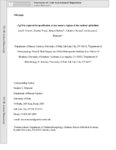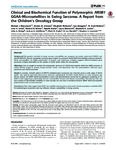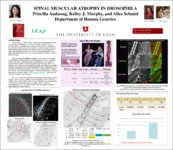Filters: Department: "Human Genetics" School Or College: "School of Medicine" Collection: "ir_uspace"
| Creator | Title | Description | Subject | Date | ||
|---|---|---|---|---|---|---|
| 1 |
 |
Mansour, Suzanne L. | Fgf10 is required for specification of non-sensory regions of the cochlear epithelium | The vertebrate inner ear is a morphologically complex sensory organ comprised of two compartments, the dorsal vestibular apparatus and the ventral cochlear duct, required for motion and sound detection, respectively. Fgf10, in addition to Fgf3, is necessary for the earliest stage of otic placode ind... | 2014-01-01 | |
| 2 |
 |
Jorde, Lynn B. | Clinical and biochemical function of polymorphic NR0B1 GGAA-microsatellites in Ewing sarcoma: A report from the Childrens Oncology Group | Background: The genetics involved in Ewing sarcoma susceptibility and prognosis are poorly understood. EWS/FLI and related EWS/ETS chimeras upregulate numerous gene targets via promoter-based GGAA-microsatellite response elements. These microsatellites are highly polymorphic in humans, and prelimina... | 2014-01-01 | |
| 3 |
 |
Secret of life module: on the brink, four profiles in groundbreaking science | This is a 15 minutes, 12 seconds segment of the WGBH series, Secret of life. Profiles include Dennis Slamon of UCLA and his work on the oncagenes and the creation of excess receptors that play a significant role in breast cancer; Patricia Steeg of the National Cancer Institute (NCI) and her work on... | Transgenic mice; Gene targeting; Genetic engineering; Molecular genetics; Cancer - Research; Capecchi, Mario R.; Science - Moral and ethical aspects; Human chromosome abnormalities - Diagnosis; Gene expression; Gene regulation | ||
| 4 |
 |
KSL News clip of Mario Capecchi receiving the National Medal of Science for 1991 | This 1 minute, 44 seconds news clip from Salt Lake City's KSLTV, Channel 5 shows Mario Capecchi receiving the National Medal of Science for 1991 from President George W. Bush at the June 13, 2002 awards ceremony. The medal was presented for Capecchi's work in genetics and his development of the pro... | Transgenic mice; Gene targeting; Capecchi, Mario R.; Science - Awards - United States; Television broadcasting of news | 1992-06 | |
| 5 |
 |
National Medals of Science and Technology Awards (2001) Ceremony and Banquet, held June 13, 2002 | This 51 minutes, 5 seconds video is divided into two parts: the first part is a film introducing the award winners and their achievements; the second is the presentation of the actual awards by George W. Bush, President of the United States. Medal winners were: Mario R. Capecchi for his pioneering... | Molecular genetics; Gene targeting; Transgenic mice; Gene expression; Genetic engineering; Capecchi, Mario R.; Science - Awards - United States; Awards presentations | 2002 | |
| 6 |
 |
Capecchi, Mario R. | Creating mice with targeted disruptions in protooncogenes and homeobox genes, NIH Director's Lecture given May 21, 1992 | This is an audio transcript of a 1 hour, 2 minutes and 12 seconds lecture given at the National Institutes of Health by Mario Capecchi on 1992/05/21. Beginning with a short summary of the mechanics of gene transfer and the ability to create germline chimera with mutations that become hereditary wit... | Transgenic mice; Gene targeting; Genetic engineering; Molecular genetics; Mutagenesis; Homeobox genes; Histology - Pathological; Gene expression; Gene regulation; Genotype; Phenotype | 1992 |
| 7 |
 |
AAMC Award for Distinguished Research presentation for 1998 | This is a 3 minutes, 51 seconds video of the presentation of the American Association of Medical Colleges' Award for Distinguished Research to Mario Capecchi and Oliver Smithies for their independent work as pioneers in gene targeting. | Transgenic mice; Gene targeting; Genetic engineering; Mutagenesis; Capecchi, Mario R.; Science - Awards - United States; Smithies, Oliver; Awards presentations | 1998 | |
| 8 |
 |
KUTV news featurette on cloning, molecular genetics, and disease aired November 9, 1997 | This 3 minutes, 1 second video clip from Salt Lake City's KUTV, Channel 2 features a short interview with Mario Capecchi concerning cloning and its use in molecular genetics and the study of human diseases. | Gene targeting; Genetic engineering; Molecular genetics; Cancer Research; Capecchi, Mario R.; Science - Moral and ethical aspects; Human chromosome abnormalities - Diagnosis; Television feature stories | 1997-11-09 | |
| 9 |
 |
Capecchi, Mario R. | Role of Hox genes in mediating the mammalian body plan | This is a 1 hour, 5 minutes, 28 seconds video of a lecture given by Mario Capecchi on the genetic analysis of the Hox complex, or Hox cluster and their role in embryogenesis. Using examples such as the development of the hindbrain (rhombencephalon), facial nerves, and hands Capecchi outlines the re... | Transgenic mice; Gene targeting; Genetic engineering; Molecular genetics; Homeobox genes; Histology - Pathological; Gene expression; Gene regulation; Genotype; Phenotype | |
| 10 |
 |
Franklin Institute award dinner and ceremony held May 1, 1997 | This is a 1 hour, 42 minutes, 53 seconds video of the 1997 Franklin Institute Awards Banquet and Ceremony. The awards included a summary of each winner's achievements, the presentation of the award, and an acceptance speech. The award winners included Ralph L. Brinster, the Bower Award and Prize f... | Transgenic mice; Gene targeting; Genetic engineering; Molecular genetics; Mutagenesis; Homeobox genes; Histology - Pathological; Gene expression; Gene regulation; Genotype; Phenotype | 1997 | |
| 11 |
 |
Albert Lasker Awards Ceremony, 2001 | This is the 1 hour, 45 minutes, and 41 seconds video of the Lasker Awards Ceremony and Banquet held in September, 2001. The Albert Lasker Award for Basic Medical Research was given to Mario R. Capecchi, Oliver Smithies, and Martin Evans for their work in genetic research. Martin Evans discovered h... | Capecchi, Mario R.; Gene targeting; Embryonic stem cells; Transgenic mice; Genetic engineering; Science - Awards - United States; Smithies, Oliver; Evans, Martin J.; Awards presentations | 2001 | |
| 12 |
 |
Local television news clips for June 14, 1994 featuring Mario Capecchi | This is a compilation of news clips from Salt Lake City's four major commercial television stations (Channels 2, 4, 5, and 13) lasting a total of 2 minutes, 59 seconds. The topic is Capecchi's winning of the General Motors Corporation's Alfred P. Sloan Jr. Prize for Outstanding Basic Science Contrib... | Transgenic mice; Gene targeting; Cancer - Research - Awards; Capecchi, Mario R.; Science - Awards - United States; Television broadcasting of news | 1994-06-14 | |
| 13 |
 |
Genetics in Utah : NPR talk of the nation, science Friday for May 15, 1998 | This is a 1 hour, 9 seconds audio transcript of National Public Radio's Science Friday that was taped at Westminster College of Salt Lake on 1998/05/15. The host, Ira Flatow, leads a panel composed of University of Utah scientists and researchers, Jeffrey Bodkin, Mario Capecchi, Ray Gesteland, Mark... | Genetic engineering; Molecular genetics; Capecchi, Mario R.; Homeobox genes; Science - Moral and ethical aspects; Human chromosome abnormalities - Diagnosis | 1998 | |
| 14 |
 |
Auduong, Priscilla; Murphy, Kelley J.; Schmid, Aloisia T. | Spinal muscular atrophy in Drosophila | Spinal Muscular Atrophy (SMA) is the most commonly inherited form of motor neuronal disease in humans and a leading cause of infant mortality. SMA is characterized by a loss of motor neurons which lead to muscle degeneration, paralysis, and eventual death by respiratory failure. More than ninety-f... | Trapeze Interactive Poster | 2010-03-15 |
| 15 |
 |
Thomas, Kirk R.; Capecchi, Mario R. | Nonreciprocal exchanges of information between DNA duplexes coinjected into mammalian. cell nuclei | We have examined the mechanism of homologous recombination between plasmid molecules coinjected into cultured mammalian cells. Cell lines containing recombinant DNA molecules were obtained by selecting for the reconstruction of a functional Neor gene from two plasmids that bear different amber mutat... | Animals; Cells, Cultured; DNA Restriction Enzymes; Kinetics | 1985-01 |
| 16 |
 |
Gesteland, Raymond F.; Atkins, John F. | Influence of the stacking potential of the base 3' of tandem shift codons on -1 ribosomal frameshifting used for gene expression | Translating ribosomes can shift reading frame at specific sites with high efficiency for gene expression purposes. The most common type of shift to the 1 frame involves a tandem realignment of two anticodons from pairing with mRNA sequence of the form X XXY YYZ to XXX YYY Z where the spaces indicate... | 1 frameshifting; 39 context effect; Codon anticodon interaction; Escherichia coli ; Recoding; tRNALys; XXXY YYZ frameshift motifs | 2002 |
| 17 |
 |
Gesteland, Raymond F. | Processing of adenovirus 2-induced proteins | Analysis of (35)S-methionine-labeled extracts of adenovirus 2-infected KB cells revealed 22 virus-induced polypeptide components. Most proteins of the virion were easily detected in extracts of whole cells labeled for short periods between 15 and 30 h after infection; however, several virion compone... | Adenoviridae; Viral Proteins; Protein Precursors; Methionine; Mouth Neoplasms | 1973 |
| 18 |
 |
Capecchi, Mario R. | Fundamental cellular processes do not require vertebrate-specific sequences within the TATA-binding protein. | The 180-amino acid core of the TATA-binding protein (TBPcore) is conserved from Archae bacteria to man. Vertebrate TBPs contain, in addition, a large and highly conserved N-terminal region that is not found in other phyla. We have generated a line of mice in which the tbp allele is replaced with a v... | Mice, Knockout; Cells, Cultured; Fibroblasts; Embryo | 2003-02-21 |
| 19 |
 |
Lopansri, Bert; Stoddard, Gregory J.; Hobbs, Maurine R.; Granger, Donald Lee | Elevated plasma phenylalanine in severe malaria and implications for pathophysiology of neurological complications. | Cerebral malaria is associated with decreased production of nitric oxide and decreased levels of its precursor, l-arginine. Abnormal amino acid metabolism may thus be an important factor in malaria pathogenesis. We sought to determine if other amino acid abnormalities are associated with disease sev... | Dystonia; Phenylalanine Hydroxylase; Tyrosine | 2006-06-01 |
| 20 |
 |
Capecchi, Mario R. | Hox group 3 paralogous genes act synergistically in the formation of somitic and neural crest-derived structures. | Hox genes encode transcription factors that are used to regionalize the mammalian embryo. Analysis of mice carrying targeted mutations in individual and multiple Hox genes is beginning to reveal a complex network of interactions among these closely related genes which is responsible for directing th... | Abnormalities, Multiple; Gene Targeting; Glossopharyngeal Nerve; Mice, Knockout; Morphogenesis | 1997-12-15 |
| 21 |
 |
Capecchi, Mario R. | Hox genes and mammalian development | We have examined the interactions of Hox genes in forming a cervical vertebrae, hindbrain, and limbs. In each case, it is apparent that individual Hox genes are performing individual functions but that more profound roles are apparent when they act in combination with others Hox genes. The observed ... | Drosophila; Gene Expression Regulation, Developmental; Homozygote | 1997 |
| 22 |
 |
Gesteland, Raymond F.; Baranov, Pavel V.; Atkins, John F.; Hammer, Andrew W. | Transcriptional slippage in bacteria: distribution in sequenced genomes and utilization in IS element gene expression | ABSTRACT: Background: Transcription slippage occurs on certain patterns of repeat mononucleotides, resulting in synthesis of a heterogeneous population of mRNAs. Individual mRNA molecules within this population differ in the number of nucleotides they contain that are not specified by the templat... | Transcription slippage; Bacterial genomes; IS element genes | 2005 |
| 23 |
 |
Thomas, Kirk R.; Capecchi, Mario R. | Location of crossovers during gene targeting with insertion and replacement vectors. | Gene targeting was used to introduce nonselectable genetic changes into chromosomal loci in mouse embryo-derived stem cells. The nonselectable markers were linked to a selectable marker in both insertion- and replacement-type vectors, and the transfer of the two elements to the Hprt locus was assaye... | Genetic Vectors; Molecular Sequence Data; Restriction Mapping | 1993-04 |
| 24 |
 |
Capecchi, Mario R. | Altered enzymes in drug-resistant variants of mammalian tissue culture cells. | Two selective procedures are compared in an effort to isolate variants of mouse L cells containing structural gene mutations. Among the resulting variant cloned cell lines are found two types of alterations in theenzyme hypoxanthine phosphoribosyl transferase (EC 2.4.2.8.) (1): enzyme with altered ... | Drug Resistance; Azaguanine; Clone Cells; Hypoxanthines | 1973-11 |
| 25 |
 |
Gussin, Gary N.; Capecchi, Mario R. | Protein synthesis directed by DNA phage messengers. | Even through the amino acids corresponding to most of the 64 nucleotide triplets are now known, several important aspects of the genetic code are not yet fully understood. In particular we need more knowledge about the "punctuation marks" of the code-for example, the signals necessary for the initia... | Carbon Isotopes; Escherichia coli; Genetic Code; Methionine | 1967-09-01 |
